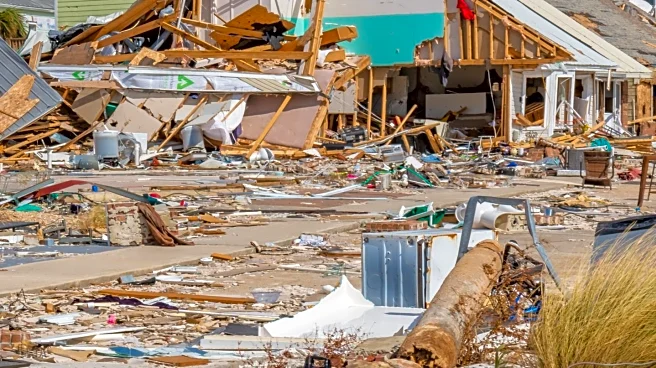What's Happening?
A powerful tornado struck Brazil's southern state of Parana, resulting in six fatalities and over 400 injuries. The tornado, with wind speeds exceeding 250 kph (155 mph), caused significant destruction, including the demolition of numerous homes. The Brazilian
government has declared an emergency in the affected region to facilitate relief efforts. Among the deceased are five adults and a 14-year-old girl. Medical facilities have treated hundreds of individuals, with several requiring surgery and some remaining in serious condition. President Luiz Inácio Lula da Silva has expressed solidarity with the victims.
Why It's Important?
The tornado's impact underscores the vulnerability of regions to extreme weather events, which can have devastating effects on communities and infrastructure. The emergency declaration highlights the need for effective disaster response and preparedness strategies. The situation may prompt discussions on climate change and its role in increasing the frequency and intensity of such natural disasters. The Brazilian government and international aid organizations are likely to focus on providing immediate relief and long-term recovery support to affected populations. The event also serves as a reminder of the importance of investing in resilient infrastructure.
What's Next?
Efforts to assess the full extent of the damage and provide aid to affected individuals are expected to continue. The Brazilian government may implement measures to improve disaster preparedness and response capabilities. International aid and support may be mobilized to assist in recovery efforts. The situation could lead to policy discussions on climate change adaptation and mitigation strategies. Monitoring the recovery process will be crucial to ensure that affected communities receive the necessary support to rebuild and recover from the disaster.
Beyond the Headlines
The tornado raises questions about the adequacy of current infrastructure and emergency response systems in handling extreme weather events. It also highlights the broader implications of climate change on global weather patterns and the need for international cooperation in addressing environmental challenges. The event may influence public awareness and attitudes towards climate change and disaster preparedness, potentially leading to increased advocacy for sustainable practices and policies. Long-term shifts in environmental policy and infrastructure development may result from the lessons learned from this disaster.















